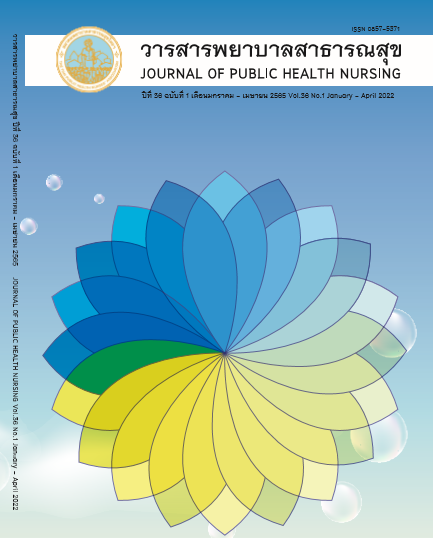Effects of Using Moodle E-learning Courseware to Provide Student’s Readiness for the National Nursing License Examination
Keywords:
Lived Experience, Patient, Spinal Muscular AtrophyAbstract
The use of Moodle e-learning courseware can help improving students’ 21st century learning skills and promoting self-directed learning. The objectives of this quasi- experimental research were to compare the students' comprehensive test scores before and after using e-learning courseware to provide students' readiness for the National Nursing License Examination in Child and Adolescent Nursing and Mental Health and Psychiatric Nursing, explore the students’ satisfaction with the use of e-learning courseware and to study the efficiency of the e-learning courseware. The population consisted of 139 nursing students. Research tools consisted of e-learning courseware, comprehensive examination, questionnaire regarding the students’ satisfaction on using e-learning courseware. Data were analyzed by descriptive statistics and Paired t-test.
Learners’ comprehensive test scores after using the e-learning courseware were higher than the pre-test at .001 level of the statistically significant difference of the both subjects – Child and Adolescent Nursing (df=138, t= 6.55), Mental Health and Psychiatric Nursing (df=138, t=6.90). Overall students’ satisfaction with the use of e-learning courseware was at high level ( = 3.69, SD = 0.38, p < 0.05). The efficiency of the e-learning courseware (E1/E2) - Child and Adolescent Nursing courseware was 78/46, Mental Health and Psychiatric Nursing courseware was 91/61 which are less than the determined criteria of 80/80. The results of this study showed that the e-learning courseware is effective for students’ readiness for the National Nursing License Examination. Students are also satisfied using the e-learning courseware. Therefore, the researchers suggest that there should be development on e-learning courseware to be more effective and cover all eight subjects. Instructors should design e-learning courseware to be more interesting and able to motivate students to use the courseware.
References
Kongkar R, Charoenkitkarn V, Tosuksri W, Sareewiwatthana P. Factors affecting the result of nursing licensure examination among bachelor graduates from faculty of nursing, Mahidol University. Nurs Sci J 2012; 30(3): 82-91. (in Thai)
Booranatanit C, Sinakom D, Boonprasert N, Theangjit R. Factors related to Thai Nursing Council’s Examination results for registering as first-class nursing and midwifery professionals of nursing graduates of Boromarajonani College of Nursing, Sawanpracharak Nakhonsawan. J Grad Res 2019; 10(2): 229-48. (in Thai)
Office of the Higher Education Commission (OHEC). Guidelines for Higher Education Standards. Bangkok: Office of the Higher Education Commission; 2018.
Chaijaroen S. Instructional design: Principles and theories to practices. 2nd ed. Khon Kean University; 2016.
Thammetar T. E-Learning: from theory to practice. Thailand Cyber University (TCU) Project: Office of the Higher Education Commission; 2014.
Ratanaterakul A. Install and system administration Moodle e-Learning (complete edition). Bangkok: SE-EDUCATION; 2015.
Chanchusakun S. Concept, principle and strategies for learning outcomes evaluation. JEM-MSU 2018; 24(1): 14-28. (in Thai)
Handayanto A, Supandi S, Ariyanto L. Teaching using Moodle in mathematics education. J Phys Conf Ser 2018; 1013: 1-4.
Puenkeaw N. Using Moodle E-Learning to develop learning achievement in Fundamental English of 1st year: International conference for innovation the second time; 2018.
Nasongkhla J. Digital learning design. Bangkok: Chulalongkorn University; 2018.
Chuencham J, Kittiboonthawal P, Ubolyaem D. Effects of using interactive E-learning lessons in students’ health examination topic among nursing students’ learning achievement. JHNR 2020; 36(2): 234-42. (in Thai)
Wajanawisit T. Development of E-learning on Information Technology course, Kuakarun Faculty of Nursing. KJN 2014; 21(1): 100-13. (in Thai)
Komonwipast N, Pakdevong N. Effectiveness of E-learning Courseware Media of BNS 408: Law and Professional Ethics for student’s readiness of nursing licensing examination 2013; Rangsit University.
Mostafa MF, Salama H, Elwasefy SA. Introducing Moodle as a new path for nursing education: Students’ perception, experience and barriers. Am J Nurs Res 2017; 5(6): 243-49.
Artsub S, Kunkum S, Sitipoomongkol A. Effectiveness of Moodle E-learning for Kinesiology Students JPR2R 2015; 2 (August): 81-9. (in Thai)
Namburi S, Sureerattanan N, Thianthong M. Development of model and software module for ethical behavior assessment and improvement regarding to learner’s learning responsibility in E-Learning environment. J YRU 2010; 5(1): 41-58. (in Thai)
Insa-ard, S. Tips e-learning instruction for instructional designer. Bangkok: SE-EDUCATION; 2018.
Downloads
Published
How to Cite
Issue
Section
License
Copyright (c) 2022 Thai Public Health Nurses Association

This work is licensed under a Creative Commons Attribution-NonCommercial-NoDerivatives 4.0 International License.
บทความที่ตีพิมพ์และแผนภูมิรูปภาพถือเป็นลิขสิทธิ์ของวารสารพยาบาลสาธารณสุข (Thai Public Health Nurses Association)







